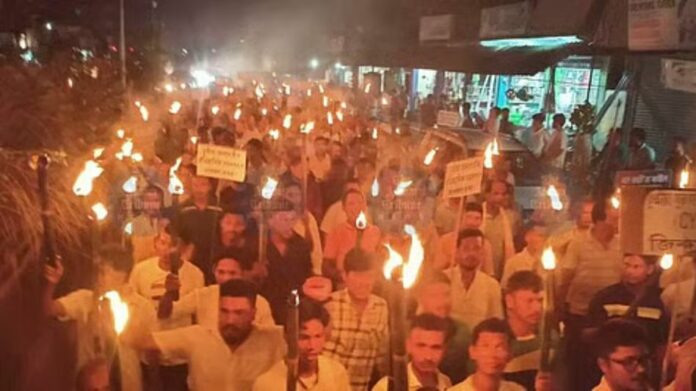Dhemaji, October 29: Thousands from Assam’s Chutia community took to the streets in Dhemaji district on Wednesday evening, staging a massive torchlight protest to press for their long-pending demand for inclusion in the Scheduled Tribe (ST) category.
Demonstrators from across Upper Assam converged in Dhemaji town, marching from multiple points with burning torches and raising slogans such as “No ST, No Rest.” The protest was jointly organised by five key Chutia organisations — the Chutia Yuva Sanmilan, Chutia Yuva Parishad, Chutia Jati Sanmilan, Chutia Jati Mahila Sanmilan, and Chutia Jati Chatra Sangstha.
Addressing the rally, Pinku Chutia, president of the Chutia Yuva Sanmilan, Dhemaji, said, “We have been demanding ST status since 1979. We possess all the features of Scheduled Tribes, yet we remain neglected.” He emphasised that the Chutia community, spread across Assam including the Barak Valley, has its own distinct culture, food, dress, and language — all qualifying criteria for tribal recognition.
The demand for ST status forms part of a decades-long movement led by six major communities of Assam — the Moran, Motok, Chutia, Tai-Ahom, Koch-Rajbongshi, and Tea Tribes. Despite multiple assurances from successive governments, the issue remains unresolved.
Chief Minister Himanta Biswa Sarma recently announced that the Group of Ministers’ (GoM) report on granting ST status to the six communities will be presented during the winter session of the Assam Assembly, scheduled to begin on November 25.
Meanwhile, similar protests have been intensifying across the state. On Tuesday, the Tai-Ahom community staged a torchlight rally in Charaideo, while Tea Tribe workers and Motok groups organised protest marches earlier in Tinsukia, Dibrugarh, and Sadiya, signalling growing discontent and renewed unity among Assam’s indigenous communities in pursuit of tribal recognition.

